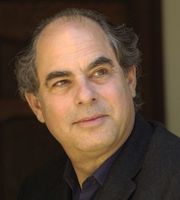Difference between revisions of "Kapstein, M."
| Line 14: | Line 14: | ||
Chicago, IL 60637 | Chicago, IL 60637 | ||
|associatedwebsite=http://home.uchicago.edu/~mkapstei/ | |associatedwebsite=http://home.uchicago.edu/~mkapstei/ | ||
| − | |bio=Associate Professor | + | |bio=Matthew Kapstein is an Associate Professor in the Department of South Asian Languages and Civilizations and the Divinity School at The [[University of Chicago]] & Directeur d’études in the division of religious studies of the Ecole Pratique des Hautes Etudes in Paris. |
| − | & | + | Kapstein has worked primarily on the philosophical traditions of later Indian and Tibetan Buddhism, and on the relationship of these with the practical and experiential aspects of religious life, including art, ritual, meditation, and yoga. He has published a collaborative volume, ''Buddhism in Contemporary Tibet: Religious Revival and Cultural Identity''; a study of the transformation of religious ideas, ''[[The Tibetan Assimilation of Buddhism: Conversion, Contestation and Memory]]''; a book devoted to Buddhist philosophy, ''[[Reason's Traces: Identity and Interpretation in Indian and Tibetan Buddhist Thought]]''; and edited a volume devoted to the comparative study of religious experience, ''[[The Presence of Light: Divine Radiance and Religious Experience]]'' ([[University of Chicago Press]], 2004). His most recent works are ''[[The Tibetans]]'' (Blackwell, 2006), an introduction to the cultural and political history of Tibet, and an edited volume, ''[[Contributions to the Cultural History of Early Tibet]]'' (Brill, 2007). (Source: '''the [[University of Chicago]] Website:''' |
| − | Directeur d’études in the division of religious studies of the Ecole Pratique des Hautes Etudes in Paris | ||
| − | |||
| − | |||
| − | |||
| − | |||
|affiliation=University of Chicago | |affiliation=University of Chicago | ||
|affiliationsecondary=Ecole Pratique des Hautes Etudes | |affiliationsecondary=Ecole Pratique des Hautes Etudes | ||
Revision as of 12:52, 18 September 2019
| Name Prefix | Dr. |
|---|
Tibetan calendar dates
| Website: | http://home.uchicago.edu/~mkapstei/ |
|---|
| Primary Language: | English |
|---|---|
| Translates from: | Tibetan |
| Translates to: | English |
- Primary Affiliation (Workplace)
- University of Chicago
- Secondary Affiliation
- Ecole Pratique des Hautes Etudes
PhD University
- Brown University
Education
Ph.D., Brown University
Biographical Information
Matthew Kapstein is an Associate Professor in the Department of South Asian Languages and Civilizations and the Divinity School at The University of Chicago & Directeur d’études in the division of religious studies of the Ecole Pratique des Hautes Etudes in Paris. Kapstein has worked primarily on the philosophical traditions of later Indian and Tibetan Buddhism, and on the relationship of these with the practical and experiential aspects of religious life, including art, ritual, meditation, and yoga. He has published a collaborative volume, Buddhism in Contemporary Tibet: Religious Revival and Cultural Identity; a study of the transformation of religious ideas, The Tibetan Assimilation of Buddhism: Conversion, Contestation and Memory; a book devoted to Buddhist philosophy, Reason's Traces: Identity and Interpretation in Indian and Tibetan Buddhist Thought; and edited a volume devoted to the comparative study of religious experience, The Presence of Light: Divine Radiance and Religious Experience (University of Chicago Press, 2004). His most recent works are The Tibetans (Blackwell, 2006), an introduction to the cultural and political history of Tibet, and an edited volume, Contributions to the Cultural History of Early Tibet (Brill, 2007). (Source: the University of Chicago Website:
- Wiki Pages
- Person description or short bio
Expand to see this person's philosophical positions on Buddha-nature.
| Is Buddha-nature considered definitive or provisional? | |
|---|---|
| Position: | |
| Notes: | |
| All beings have Buddha-nature | |
| Position: | |
| If "Qualified", explain: | |
| Notes: | |
| Which Wheel Turning | |
| Position: | |
| Notes: | |
| Yogācāra vs Madhyamaka | |
| Position: | |
| Notes: | |
| Zhentong vs Rangtong | |
| Position: | |
| Notes: | |
| Promotes how many vehicles? | |
| Position: | |
| Notes: | |
| Analytic vs Meditative Tradition | |
| Position: | |
| Notes: | |
| What is Buddha-nature? | |
| Position: | |
| Notes: | |
| Svātantrika (རང་རྒྱུད་) vs Prāsaṅgika (ཐལ་འགྱུར་པ་) | |
| Position: | |
| Notes: | |
| Causal nature of the vajrapāda | |
| Position: | |
